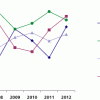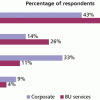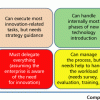Business Transformation Requires Transformational Leaders
Leadership and teaming skills are front and center in times of rapid change. Meet today’s constant disruption head on with expert guidance in leadership, business strategy, transformation, and innovation. Whether the disruption du jour is a digitally-driven upending of traditional business models, the pandemic-driven end to business as usual, or the change-driven challenge of staffing that meets your transformation plans—you’ll be prepared with cutting edge techniques and expert knowledge that enable strategic leadership.
Recently Published
A year ago, most budget researchers like myself were hopeful that the budgets for the coming years would reflect an economic stability -- where businesses and nonprofits alike could begin rebuilding as unemployment concerns started fading away. Yet as the new year dawned, however, it became obvious that world economies had not turned the corner.
Top 10 lists, year-in-reviews, and predictions abound at this time of the year. Since we don’t like to miss any of the fun, we asked Cutter Senior Consultants and Fellows to share their predictions for the business-IT landscape in 2013.
Artful and Industrial Making
I have recently confronted a need to revisit these topics. To remount, if you will, my hobbyhorse. Industrial thinking and methods, never quiet for long, seem poised to make further advances in the ongoing struggle to standardize work (of the many) for the convenience of those in charge (the few). I believe we should resist whenever we can.
Strategic Adoption of New Collaboration Technologies
The Software Engineering Institute (SEI) has a long history of process improvement research, and -- like almost everyone who has proposed a model or method for software -- a long history of fighting misperceptions. Chief among these is the idea that picking the "best" model or method and checking off a series of boxes will fix whatever ails you, indefinitely.
In this series of Advisors ("What's a Knowledge Worker to Do? Part I" and "What's a Knowledge Worker to Do?















